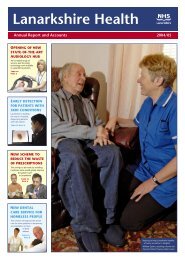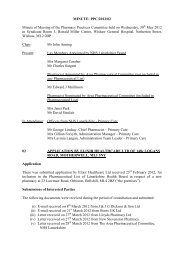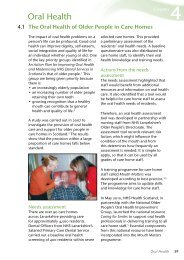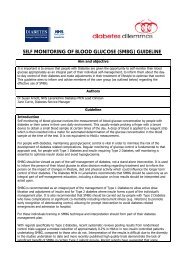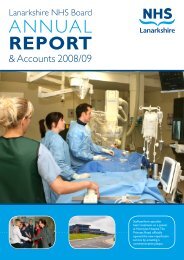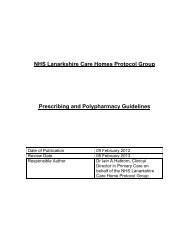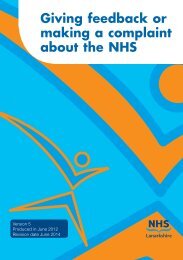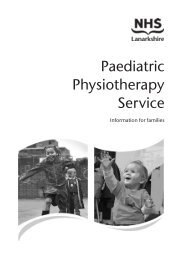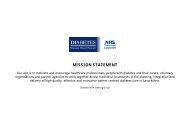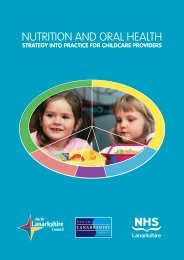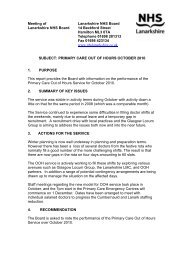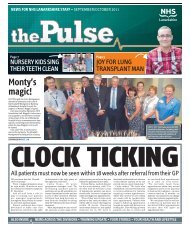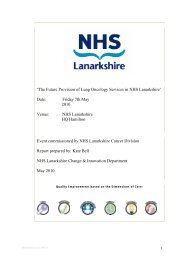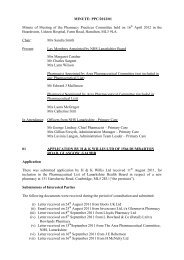Palliative Care Guidelines - NHS Lanarkshire
Palliative Care Guidelines - NHS Lanarkshire
Palliative Care Guidelines - NHS Lanarkshire
- No tags were found...
You also want an ePaper? Increase the reach of your titles
YUMPU automatically turns print PDFs into web optimized ePapers that Google loves.
<strong>Palliative</strong> <strong>Care</strong> <strong>Guidelines</strong>: HiccupHiccup in <strong>Palliative</strong> <strong>Care</strong>IntroductionHiccups lasting more than 48 hours are not uncommon in patients with advanced cancer and canbe very distressing.Assessment• Causes in patients with advanced cancer include:o Gastric stasis and distension (most common cause)o Gastro-oesophageal refluxo Metabolic disturbances (eg. uraemia, hypercalcaemia)o Infectiono Irritation of diaphragm or phrenic nerveo Hepatic disease/ hepatomegalyo Cerebral causes (e.g. tumour, metastases)Management• Treat reversible factors.• Hiccups often stop spontaneously. Treatment is only required if hiccups are persistent.• Try simple physical manoeuvres initially and those that worked previously.Medication• Prokinetic: domperidone or metoclopramide oral 10-20mg, 8hourly.• Treat any gastro-oesophageal reflux with a proton pump inhibitor.• Dexamethasone oral 4-8mg in the morning may reduce compression/ irritation if the patienthas a hepatic or cerebral tumour. Stop if no benefit after a week.• Other options for intractable hiccups supported by limited evidence include:• haloperidol oral 0.5-1mg at bedtime for under 2 weeks to avoid side effects.• baclofen oral 5-20mg, 8 hourly (avoid abrupt withdrawal).• levomepromazine oral 3-6mg at bedtime(now used as an alternative to chlorpromazine; avoid if hypotensive).• nifedipine oral 5-20mg, 8 hourly (avoid if hypotensive).• If other treatments are unsuccessful and the patient is very distressed, try midazolamSC 10-30mg / 24hours as an infusion via a syringe driver or pump, reducing the dose as thepatient improves.Non-drug• Simple measures or ‘home remedies’ can be effective.o Sipping iced water or swallowing crushed ice.o Breathing into a paper bag particularly if the patient is hyperventilating.o Interrupting normal breathing e.g. holding breath.o Rubbing the soft palate with a swab to stimulate the nasopharynx.• Acupuncture may be effective.ResourcesProfessional<strong>NHS</strong> National Library for Health: http://cks.library.nhs.uk/hiccups/quick_reference_guidePatienthttp://cks.library.nhs.uk/hiccups/patient_informationKey references1. Regnard C. Hiccup. In Oxford Textbook of <strong>Palliative</strong> Medicine. 3 rd Edition 2004, p477-92. Back I. <strong>Palliative</strong> Medicine Handbook http://www.pallcare.info/Further reading: http://www.palliativecareguidelines.scot.nhs.uk© <strong>NHS</strong> Lothian Issue date: January 2009 Review date: March 20121



